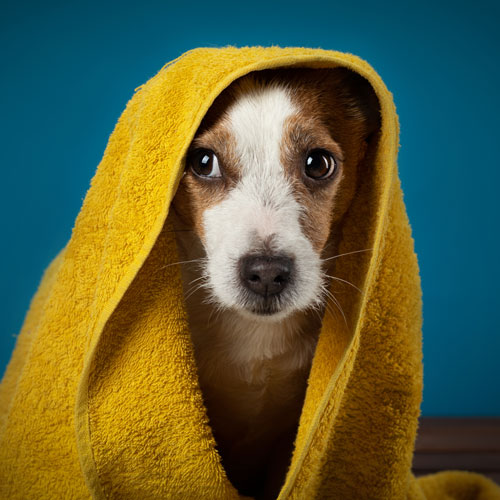Last Updated on 2 years by Dr Alisha Barnes
 Picture this. You’re settling down for the evening, you’ve already gotten into bed or otherwise hunkered down for sleep, and your faithful dog is somewhere near you, also preparing to sleep. You turn out the lights.
Picture this. You’re settling down for the evening, you’ve already gotten into bed or otherwise hunkered down for sleep, and your faithful dog is somewhere near you, also preparing to sleep. You turn out the lights.
You prepare to drift off… and you hear your dog whining, quietly under their breath. Sometimes, you may even hear your dog whimper at a louder capacity. Why is your dog making this sound? Why is my dog whining at night for no reason?
There could be several reasons
Your Dog is Still a Puppy
The most common reason that your dog may be whining at night for seemingly no reason is because your dog is still a puppy! Puppyhood (or the puppy maturation process) lasts between one and two years.
During this time, your puppy is maturing and growing not just physically, but emotionally, too. Puppies tend to be full of energy, easily distracted, and subject to separation anxiety from their litter, their mother, and their humans.
If you find that your puppy is whining at night for seemingly no reason, and this happens consistently each night, there’s a very good chance that your puppy is just feeling the spectrum of emotions associated with growth—new habit, new routine, new environment, and the most difficult of all—no attention!
Your Dog is in the Process of Being Trained
Another reason why your dog may be whining in the evenings or at night is because your dog is in the process of being trained. If you have transitioned your dog into a new space or environment (into or out of a crate, for example), your dog may be feeling disoriented or uncomfortable.
Each time your dog undergoes a training process, they’re “out of their element.” This is completely normal, and, in fact, one of the ways that you know your dog is beginning to recognize the differences between certain behaviors and boundaries.
If your dog has recently been trained not to get up on the bed or the couch, for example, this is another reason that they may whine in the evenings when they’re used to being in a different location (or closer to you). If your dog is in the process of being trained not to jump on people or furniture, investigate leftover plates or bags, or dig in the cushions, this could also contribute to whining at night, presuming that these are activities that your dog used to engage in.
Your Dog Has Separation Anxiety
Is your dog used to being with a specific person who’s not currently around? Or, is your dog used to being on or near your body, and is now being prevented from doing so?
Your dog may have separation anxiety. If this is the case, your dog might be exhibiting a very natural emotional response to being unable to be near you or another special person. If your dog whines at night because of separation anxiety, it is likely because they are craving the comfort that they associate with a specific person.
Your Dog’s Stomach Is Upset
Occasionally, your dog’s stomach may become upset, and they may experience gas or bloating. If you’ve recently changed your dog’s diet, or you witnessed your dog eat something unusual and they are whining at night in the same timeframe, there’s a possibility that they could be in discomfort due to digestive issues. If your dog is in visible discomfort due to digestive distress, it’s advisable that they be transported to receive medical care as soon as possible.
Your Dog’s Schedule Is Not Aligned With Yours
Life changes quickly, and sometimes in big ways—if you’ve suddenly changed your job, moved, or are undergoing some other life and schedule change, then it’s possible that your dog’s schedule is no longer aligned with yours.
Are you no longer visiting the park or going on walks at the same time that you used to? Have you skipped some days visiting your pup’s favorite pal? Have you not been home recently, or been home more than usual? If you or your dog’s routine has changed recently, your dog could be stressed or disoriented as a result of this change.
Your Dog is Afraid
Another important thing to remember is that your dog may be afraid. Is there a thunderstorm currently happening? Is it the Fourth of July? Fireworks, loud noises and bright flashes of light, and other sensory factors can cause your dog to feel afraid.
If your dog feels afraid, they may whine—particularly if the event causing them fear is occurring at night, or they associate night with a specific experience. Monitor your dog’s behavior and you may be able to distinguish what is causing them to fear.
Your Dog is In Pain
Finally, your dog may whine at night because they are in pain. If your dog is whining under their breath, or whimpering and shrieking, they may be experiencing discomfort—particularly if their body language changes, or they whine or whimper to the touch.
If your dog’s pain reaction is severe, seek immediate medical treatment. If your dog appears to be in minimal discomfort, or you have been noticing a recurring pattern, try to notice what positions and movements are causing your dog to become uncomfortable.
Oftentimes, joint pain and muscle stiffness can lead to discomfort in dogs. This is where a dog chiropractor comes in! Dog chiropractors are experts of dog back, neck, and body pain, and can help alleviate the pain so that your dog can get back to living their best quality of life.
If you suspect that your furry friend is experiencing joint or muscle pain, or even a pinched nerve, book your appointment today.
